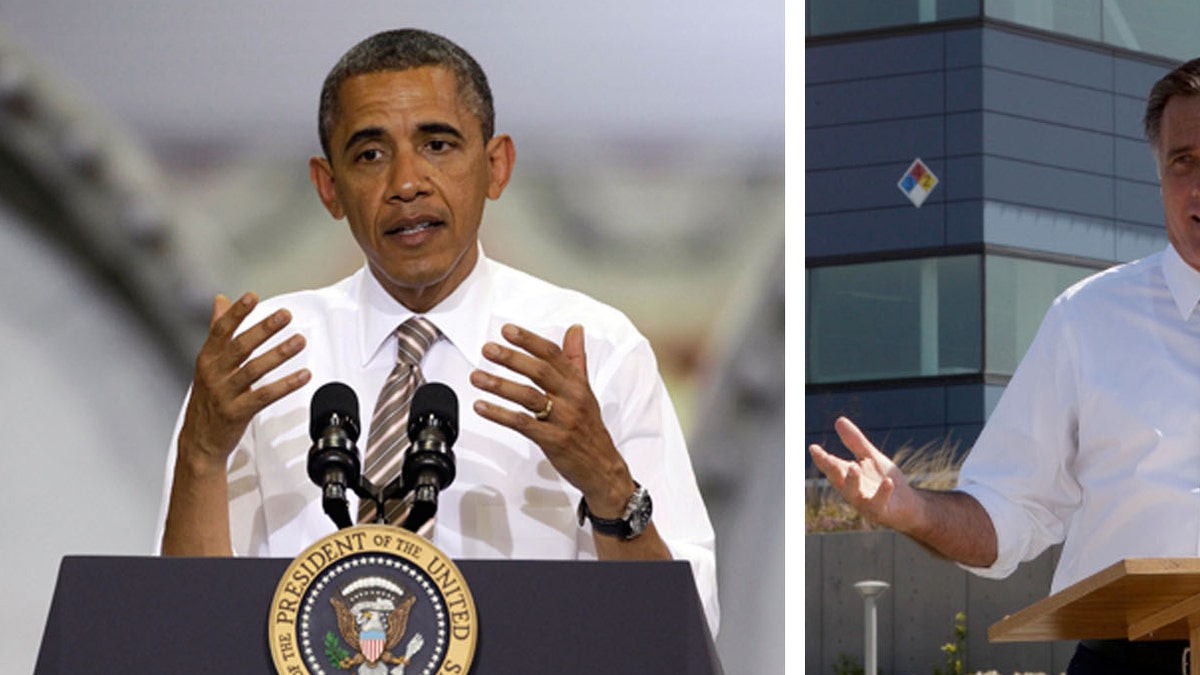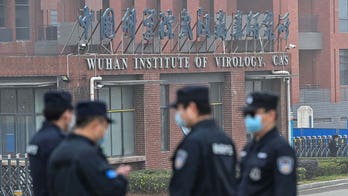
This combination of Associated Press file photos shows from left, President Obama speaking at the TPI Composites Factory, a manufacturer of wind turbine blades on May 24, 2012, in Newton, Iowa, and Republican presidential candidate, former Massachusetts Gov. Mitt Romney speaking at the Solyndra manufacturing facility on May 31, 2012, in Fremont, Calif. The weak May unemployment report released Friday, June 1, 2012, presents President Barack Obama with a sobering reminder that his stewardship of a gradual recovery from the deepest recession since the Great Depression presents a tenuous argument for his re-election. However anemic job growth and an uptick in joblessness to 8.2 percent give new resonance to Republican presidential rival Mitt Romney's campaign. (AP Photo/Charlie Neibergall, Mary Altaffer. File) (AP)
President Barack Obama and Republican Mitt Romney remain holed up with advisers Monday, the incumbent determined to bounce back in the coming debate from a poor performance in the first confrontation and the challenger hard at work honing his strong showing that curtailed the president's steady advance in the polls.
Both men realize the outcome of the Nov. 6 election could turn on Tuesday's town hall debate at Hofstra University in Hempstead, New York, exactly three weeks before voters go to the polls in the exceedingly tight contest for the White House.
With early voting is already under way in dozens of states, including some battleground states, the candidates will have little time to recover from any slipups. Through Monday, either absentee or in-person early voting had begun in 43 states of the 50 states.
The outcome in battleground states -- those that do not reliably vote Republican or Democratic -- are critically important in the U.S. system where president is chosen not by a nationwide popular vote but in state-by-state contests.
Both campaigns were working feverishly in the nine most competitive states -- Colorado, Florida, Iowa, Nevada, New Hampshire, North Carolina, Ohio, Virginia and Wisconsin -- to get their core supporters to vote early and persuade undecided voters to back their candidate. The Obama camp was releasing a new television ad in four of those states Monday focusing on the economy, the chief issue among voters in this year's election. Obama has been pointing to lower unemployment -- the rate having fallen to its lowest point since Obama took office -- and improving consumer confidence.
But Obama's re-election bid remains burdened by the slow economic recovery from the Great Recession and near meltdown of the U.S. financial system, both of which were ripping away at the economy when the president took office.
While Obama's campaign seeks to rebound from a dismal first debate and promises a more energetic president will take the stage Tuesday night, Romney's team aimed to build on his commanding first debate that gave the Republican new life in a White House race that had appeared to be slipping away from him.
Much of the pressure in the coming debate will be on Obama, who aides acknowledge showed up at the first faceoff with less practice -- and far less energy -- than they had wanted. The president and a team of advisers are seeking to regain focus with an intense, three-day "debate camp" at a golf resort in Williamsburg, Virginia.
"It is going great," Obama said of his preparations Sunday, while taking a brief break to greet volunteers at a nearby campaign office.
Romney, who places a huge priority on the debates, was practicing Monday near his home in Massachusetts.
Romney's advisers suggested the Republican nominee would continue to moderate his message -- in tone, if not substance -- as he did in the Oct. 3 meeting to help broaden his appeal to the narrow slice of undecided voters. In recent days, Romney has promised his tax plan would not benefit the wealthy, emphasized his work with Democrats as Massachusetts governor and downplayed plans to strengthen the nation's abortion laws.
He told an Iowa newspaper this week, for example, that he would not pursue abortion-related legislation if elected. That's in direct conflict with last year's pledge to the anti-abortion group, the Susan B. Anthony List, to cut federal funding from Planned Parenthood and support legislation to "protect unborn children who are capable of feeling pain from abortion."
"I think Mitt Romney's performance was, indeed, magical and theatrical. Magical and theatrical largely because for 90 minutes he walked away from a campaign he had been running for more than six years previous to that," Obama senior campaign adviser Robert Gibbs said of the first debate.
Democrats were dismayed that Obama didn't more aggressively call out Romney's move to the middle during the first debate. Since then, the president has been more forceful in doing so on the campaign trail and in television ads.
During debate preparations, aides are working on tailoring that message to a debate format. And they're working on balancing aggressive tactics with the debate's town hall format, which often requires candidates to show a connection with questioners from the audience.
Romney aides suggested the former Massachusetts governor would be prepared regardless of Obama's adjustments.
"The president can change his style," Romney adviser Ed Gillespie said on "Fox News Sunday." "He can change his tactics. He can't change his record."




